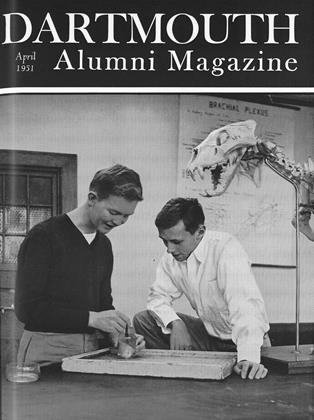"A Poor Prelude"
TO THE EDITOR:
How pathetically inadequate Mr. Towler's proposals are, Mr. Momsen's letter in the same issue unwittingly demonstrates. Clearly there will be students at Dartmouth—how many we cannot tell—who will resist formalized, open instruction in Americanism. Thus it will not suffice, as Mr. Towler suggests, for professors "to teach Americanism along with their subjects" else some students will master the latter and pay little attention to the former. Each subject must be interpenetrated with Americanism so that it cannot be disentangled. Let us have no exceptions and no excuses. The Russians have shown us what can be done with genetics. Still, no matter how skillful the blending, some undergraduates will probably suspect that professors who have taken an oath to teach Americanism are trying to indoctrinate them. Since this will arouse antagonism, a poor prelude to learning, perhaps we had better drop the oath. Surely, the anti-Communists have the right to use the subtle and indirect methods which the communists on our faculties have employed so long and with such effectiveness. I am afraid that Mr. Towler has not thought this thing through.
Madison, Wis.
Credit Qualified
To THE EDITOR
It was with great interest that I read Professor Lathrop's article in the January issue of ALUMNI MAGAZINE.
In the last full paragraph on page 18 Professor Lathrop, in referring to Homer Eaton Keyes, states that "in 1921 he left Dartmouth to found and edit the scholarly and highly successful magazine Antiques."
May I suggest that the implication is misleading for the facts are that it was Keyes' 1900 classmate, Frederick E. Atwood (already the owner of prosperous publications) who developed the idea for Antiques, who provided the capital to establish it and who invited Keyes to serve as its editor.
It could have been fairly said that Keyes was associated with Atwood in the founding of Antiques. Their association in the venture proved to be remarkably successful and Keyes' contribution to that success was indispensable. After the sale of Antiques to interests in New York Keyes continued as editor until his death in 1938.
Newtonville, Mass.
John Poor Memoirs
To THE EDITOR:
This last fall, it was necessary for me to spend some time in Hanover. During that stay, it was quite forcibly brought home to me that my father, the late Prof. John M. Poor '97, continues to live at Dartmouth. Many of his stories, his deeds, his interests, etc., are practically Dartmouth folklore. Unfortunately, some of these tales have been altered to give meaning which I am sure that my father did not intend.
It has always been my fond hope that one of my father's close associates might undertake to make a collection which would be a written record, and a more authentic record than the
"word of mouth" retellings. However, this collection has not been made.
Since I would like to have such a collection for my own personal interest, I have made a small start by contacting various faculty members and requesting a contribution from each. All with whom I have talked are in favor of such a collection being made and all have promised me their memoirs of John M. Poor.
There are among the Dartmouth alumni, I am sure, men who would have interesting and valuable contributions to make. I would like, therefore, to appeal to this source through the DARTMOUTH ALUMNI MAGAZINE.
I wish to assure contributors that it is not my intention to capitalize on this material; I am just beginning to appreciate what a unique person my father was. I have a young nephew, my father's namesake and only grandchild, who was born four years too late to know him. It is my hope that through such a collection as I am now attempting to make, young John may come to know the man for whom he was named.
Box 28Glendale, Mass.
That Princeton Game
TO THE EDITOR:
I have just read the letter in the January issue by Mr. T. R. Robie and I was very gratified to find him writing a letter which I have postponed writing too long. I would like to echo Mr. Robie's resentment as one of a party of twelve Dartmouth alumni and dates who invested $48.00 to sit at home and listen to that travesty over the radio.
It was not only unfair to the ticket purchasers but even more so to the players of both teams who were forced to play in that monstrous weather. Almost every New York paper stated that the game was a farce and the schools had no right to go ahead and play it, especially in the light that the Rutgers-Colgate game was cancelled a few miles away.
When one considers that 36,000 people invested $144,000 and did not see this game, one begins to question seriously the judgment of the Athletic Associations which could easily have postponed the game one week and accommodated a great many more than the suffering 5,000 (mostly Princeton undergrads) who braved the ordeal. I hope the Athletic Association has been well acquainted with the opinion of the New Jersey alumni on this matter.
West Long Branch, N.J.
 View Full Issue
View Full Issue
More From This Issue
-
 Article
ArticleIt All Began in Hanover
April 1951 By FORD H. WHELDEN '25 -
 Article
Article1951 Fund Agents
April 1951 -
 Class Notes
Class Notes1918
April 1951 By ERNEST H. EARLEY, DONALD L. EARR, RICHARD A. HOLTON -
 Class Notes
Class Notes1949
April 1951 By ROBERT H. ZEISER, DAVID S. VOGELS JR., JOHN F. STOCKWELL -
 Class Notes
Class Notes1923
April 1951 By TRUMAN T. METZEL, COLIN C. STEWART 3RD, LEON H. YOUNG JR. -
 Class Notes
Class Notes1911
April 1951 By NATHANIEL G. BURLEIGH, SARGENT F. EATON, MALCOLM G. ROLLINS







